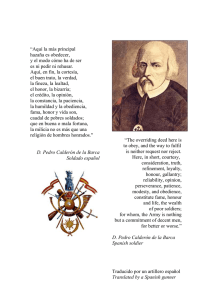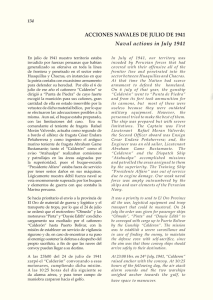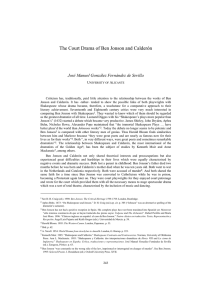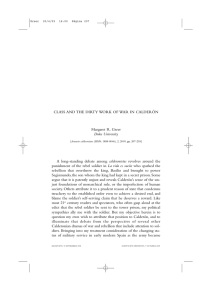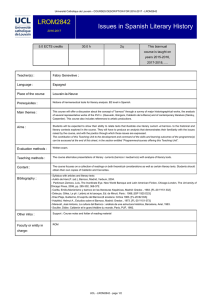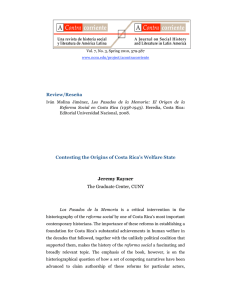History as Ideology: The Shaping of National Identities in the
Anuncio
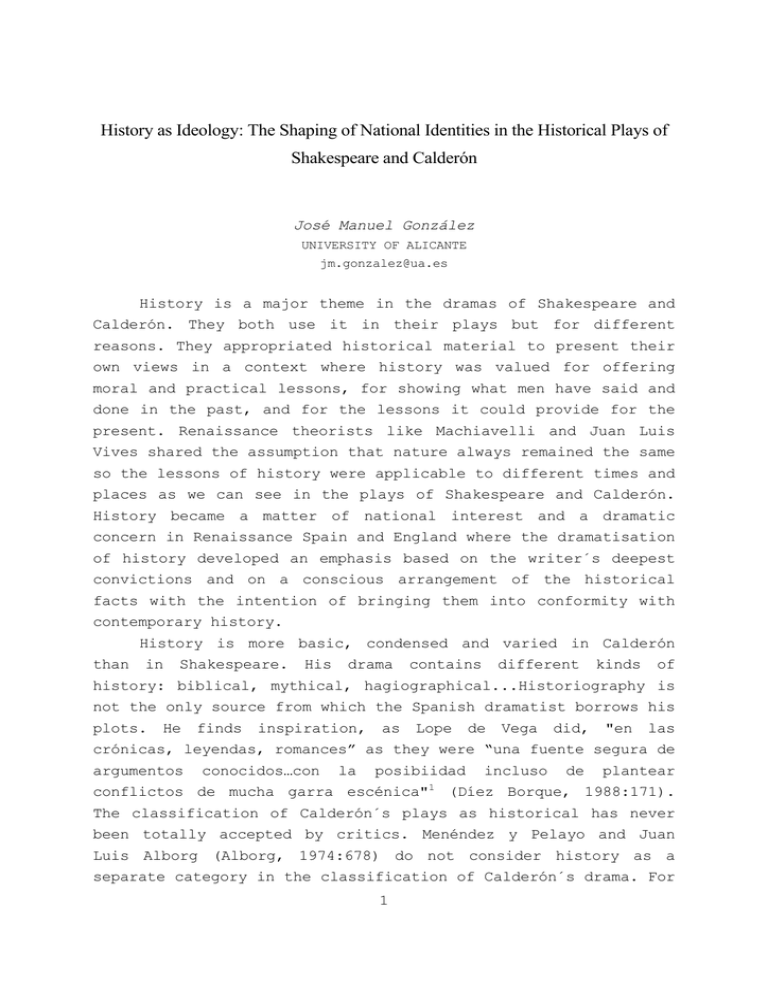
History as Ideology: The Shaping of National Identities in the Historical Plays of Shakespeare and Calderón José Manuel González UNIVERSITY OF ALICANTE jm.gonzalez@ua.es History is a major theme in the dramas of Shakespeare and Calderón. They both use it in their plays but for different reasons. They appropriated historical material to present their own views in a context where history was valued for offering moral and practical lessons, for showing what men have said and done in the past, and for the lessons it could provide for the present. Renaissance theorists like Machiavelli and Juan Luis Vives shared the assumption that nature always remained the same so the lessons of history were applicable to different times and places as we can see in the plays of Shakespeare and Calderón. History became a matter of national interest and a dramatic concern in Renaissance Spain and England where the dramatisation of history developed an emphasis based on the writer´s deepest convictions and on a conscious arrangement of the historical facts with the intention of bringing them into conformity with contemporary history. History is more basic, condensed and varied in Calderón than in Shakespeare. His drama contains different kinds of history: biblical, mythical, hagiographical...Historiography is not the only source from which the Spanish dramatist borrows his plots. He finds inspiration, as Lope de Vega did, "en las crónicas, leyendas, romances” as they were “una fuente segura de argumentos conocidos…con la posibiidad incluso de plantear conflictos de mucha garra escénica"1 (Díez Borque, 1988:171). The classification of Calderón´s plays as historical has never been totally accepted by critics. Menéndez y Pelayo and Juan Luis Alborg (Alborg, 1974:678) do not consider history as a separate category in the classification of Calderón´s drama. For 1 them history did not have enough relevance and significance to be treated as a separate part in the division of his dramatic output. However, for Díez Borque and Ignacio Arellano a section devoted to history makes sense because of the importance that the dramatisation of history occupies in Calderón´s plays. Plays like Las armas de la hermosura, Amar después de la muerte, o El Tuzaní de la Alpujarra, La cisma de Inglaterra, El príncipe constante, and El sitio de Breda should be, therefore, included in the category of historical drama (Díez Borque, 1988:171-173). Ignacio Arellano (1995:487-88), for his part, adds new titles to the list of Calderón´s historical works. El mayor monstruo del mundo, and La aurora en Copacabana are historical in the broadest sense of the term. History cannot be reduced simply to accurate accounts of chronicles and historiography for there are historical truths in other narratives and stories as well. The idea of history in Calderón is not so rich and elaborate as in Shakespeare´s history plays. While he is concerned with the dramatisation of historical events, they are not fully staged since he does not bring out all their historical implications and possibilities. Thus Paloma Fanconi proposes to call Calderón´s historical plays, plays "de ambientación histórica" as he is not pretending "´hacer historia…ni siquiera ser fiel a las fuentes o a la más rigurosa veracidad, sino usar estos ambientes para defender en cada momento lo que considerara oportuno"2 (Fanconi, 2000:104). However this is a simplification and reduction of their historical potential as he uses history for theatrical reasons and a dramatic purpose. Calderón and Shakespeare portray historical events under certain assumptions, transforming them into dramatic art. The result is not historical evidence but a partial interpretation of reality for the sake of particular interests and aims3 as historical contents are “as much invented as found” (White, 1987:82). Hence there is no history without interpretation. The playwright uses history to provide specific meanings to relevant events for “historical discourse is in its essence a form of ideological elaboration”4. 2 Once the dramatist has the historical information, he manipulates and interprets the facts available dramatically. The playwright acts as an interpreter of historical events. He is not neutral in his presentation of history. Thus historical plays are both a dramatization and an interpretation of history. The dramatist becomes a sort of historian5 since he gives a particular interpretation to historical truth according to his personal ideology and dramatic intention as Shakespeare does in his appropriation of English history (Milward, 1978:80). Calderón´s historical plays also manifest this concern and purpose. “La ambientación histórica, pues, no es mas que un telón de fondo para defender y propagar ya sea sus ideas políticas, éticas, religiosas o sociales”6 (Fanconi, 2000:104). Hence the literary use of history is not only the result of artistic, linguistic or aesthetic considerations but also draws on the personal and contextual experience of the writer. Ideology is important for both the interpretation and dramatisation of "The historical facts and contents of literary works" because they “are already culturally produced". This is why "historical discourse in its essence [is] a form of ideological elaboration" (Kamps, 1996:9/4). For Jonathan Dollimore (1992:183) ideology "is composed of those beliefs, practices and institutions which work to legitimate the social order" as seen in Renaissance drama which contributed to shape particular ideologies, reinforcing and demystifying different forms of power and control. Furthermore for the dramatist the process of textual production "is the process whereby ideology produces the forms which produce it, thus determining in general both the instruments and devices which work it, and the nature of the work-process itself” (Eagleton, 1982:84). Ideology anticipates and, determines history which cannot be neutral as it is always the result of particular appreciations and manipulations. Shakespeare7 and Calderón8 use historical drama as an effective instrument of political propaganda. The workings and 3 conflicts of power are a major concern for both dramatists9 who share an interest in the dramatisation of kingship since kings played a central role in their historical plays as well as in the politics of their time. By bringing kings to the stage they both presented and reflected current ideas on monarchy. They expressed the belief in the inalienable divine right conferred on kings by hereditary succession as part of the hierarchical pattern of the universe. At that time Kings were believed to be God´s representatives on earth, where they were obliged to perform a task for which they had full power over life and death. The doctrine of divine right placed them legally and morally above all human law and restraint. Thus the king became "the master and maker of history" (Kamps, 1996:3). He was godlike in attributes and prerogatives as we learn from Lope de Vega´s El saber puede dañar when Camilo answers the Príncipe: Príncipe. ¿Quién es el rey Camilo. Un hombre semideo que tiene de Dios solo dependencia, a quien todos le prestan obediencia y es única justicia que el bien premia y que castiga el mal. Royal authority comes from God. The divine condition of kings enables them to dispense justice and punish vice. Don Fernando incarnates all these attributes in El príncipe constante10 where he becomes a model to be imitated as "Success in rulership is equated with morality in rulership" (Fox, 1986:116). The king, in this way, is idealised not only as the symbol of political stability but also as the mirror of public morality and integrity. He is supposed to be the most morally suitable because of his divine function within a providentialist conception of kingship which comes to legitimise and sanctify royal power. Richard II is well aware of it when he expresses his worries and fears at Bolingbroke´s attempts to gain power at any cost: 4 For every man that Bolingbroke hath press´d To lift shrewd steel against our golden crown, God for his Richard hath in heavenly pay A glorious angel: then, if angels fight, Weak men must fall, for heaven still guards the right. (RII 3.2.58-62) Richard´s speech demonstrates his own hopes, political interests, and religious beliefs when his fall is at hand. He tries to retain his sacred status without fully accepting the sacred function but finally he must surrender to Bolingbroke´s insurrection. Bolingbroke´s actions are going to speak louder than Richard´s words as the English king remains doubtful about his right and his moral fitness to be king (RII 3.3.143-175). He forgets that divine right must be combined with political reality. Richard´s qualities and abilities have disqualified him for his royal task, as Bolingbroke makes clear to the nation when he deposes him and ensures his murder at Pomfret castle. This criticism and desmytification of kingship is not so evident and meaningful in Calderón. The myth of kingship prevails over other critical considerations since "el prestigio del monarca o de la ley, siempre quedan preservados"11 (Nuñez, 2000:126). However Calderón´s historical drama also shows the negative aspects of kingship in a context of crisis and decadence. Kings do not always perform their divine function according to highest moral standards as, for example, in the case of Enrique VIII in La cisma de Inglaterra12. He is presented as the victim of a burning, uncontrollable passion which is evil: ¡Ay de mí que me abraso! ¡Ay Cielos, que me quemo! No es de amor este extremo; mover no puedo el paso. Algún demonio ha sido espíritu que en mí se ha revestido. (1617-1622) 5 The king seems to be no longer God´s representative on earth. He is caught in the middle of a sea of troubles and doubts expressing his inner division and confusion. He has no power to resist temptation. Thus kingship is demystified as the king himself is also subject to the weakness of the flesh. His heavenly mission has been reduced to a private affair. Enrique personifies the contradiction between office and self, showing the discrepancy between ideal competence and personal performance. He has been legitimately chosen but he has shown himself morally unsuited for kingship. And although he repents he cannot avoid – in Calderón´s play - the final disintegration of his kingdom. His wrongdoings have had negative consequences for him and the nation. This tragic end brings the king to despair: "¡Pobre Enrique!/ ¡Qué de años que te esperan!" (2940-41) as the outbreak of "civil guerra" is the real threat to peace and political stability. But his failure is not so tragic as that of Richard II whose deposition makes him face a personal dilemma: "What must the king do now? Must he submit?/ The king shall do it. Must he be deposed?...Must he lose/ the name of king?" (RII 3.3.143-146). Royal authority and legitimacy are also put into question in Calderón´s play where Catalina´s condition reflects Richard II´s doubts and fears when she loses her royal position. History is shown to be strongly influenced by individual decisions. It is not pre-arranged as in the Medieval view since man is a decisive agent and his decisions can change its course. Calderón´s historical drama also reflects the tensions and contradictions of power in Seventeenth-century Spain. In La hija del aire, a dramatisation of the history of Assyria, Semíramis complains about the difficulties the ruler has in keeping office and taking his own decisions: Los que contra mí siguieron ayer el bando son hoy los mismos de quien estoy idolatrada; y pues fueron 6 tales mis dichas, que vieron estos aplausos, mudar con industria singular todos los puestos espero; que si no hago lo que quiero ¿De qué me sirve reinar? (778) This resembles the situation in Spain where policy was in the hands of King Philip IV´s favourites who - like the Count-Duke of Olivares - tried to get power at any cost. They were the actual rulers with the royal blessing and consent. Their arrogance and ambition had a negative effect on the country and the politics of the time, though it might be argued that it was not their fault but the king´s who allowed them to be in power. Although Calderón´s historical drama generally speaking - has a propagandistic intention in the glorification of kingship, he is also critical of the political situation as his mythological court plays show. They were intended to be a dramatic protest against absolute authority in a time of the degradation of monarchy. In them, Calderón voices his concern and pessimism, "coating the criticism with generous doses of humour and spectacular brilliance" (Greer, 1991:94). Calderón´s historical plays are also critical of imperial authority which is threatened by suspicion and division in El mayor monstruo del mundo as Octaviano recognises before Herod: Yo soy tu rey y tu dueño. Por mí, Tetrarca, gobiernas, estrella eres de mi Sol, aunque aborrecida estrella, y así cuantos contra mí, con traiciones, con cautelas quieren aspirar negando a mi poder la obediencia haré yo... (471) 7 The clouds of treason hide the powerful sun as some of the stars of the constellation have revolted against him. He demands obedience which is no longer possible in a world on the point of political collapse and disintegration. Octaviano´s royal metaphor reminds us of Falstaff´s awareness of Hal´s royal condition and enterprise. He is "the blessed sun of heaven" (1HIV 2.4.403) who must display the power of his rays to give life to a divided body in need of political unity and support. Jealousy and monstrosity in Calderón´s play are a direct consequence of the chaotic and rotten state which makes Herod a deformed and monstrous traitor (Arellano, 1995:497). The historical plays of Shakespeare and Calderón not only explore particular ideologies and strategies but they also dramatically contribute to the shaping of the national identity. They are concerned with the idea of nationhood as the embodiment of certain values and beliefs. They facilitate the construction and consolidation of a culture, a language and a religion. In El sitio de Bredá, which contains a detailed account of the siege of Bredá in 1624, we are presented with an exaltation and glorification of Spain and its empire. Spain is the chosen nation, destined to rule over the entire world as the Príncipe states: Ya ¿qué tengo que mirar? Solo el Rey de España reina; que todos cuantos imperios tiene el mundo son pequeña sombra muerta a imitación de esta superior grandeza. (128) He praises national greatness and anticipates the Spanish victory at Bredá after a siege of nine months. It seems as if the mere presence of Spanish troops guaranteed instant success: defeat was most unlikely. Spain´s universal designs and imperialism made Spaniards arrogant and proud of their historical mission. 8 Calderón´s play echoes the official concept of the nation´s destiny as promoted by the Count-Duke of Olivares placing this military success "within the mythology of imperialism" (Whitaker, 1978:525). However the play "Despite its patriotic tone,...includes passages that can be interpreted as critical of Spain´s war in the Netherlands" (Loftis, 1987:191). It criticises the political situation and the manipulation of imperialist propaganda at a time when the Spanish empire was threatened by internal conflicts. From this perspective Esta defensa del Imperio y la alegría popular ante las victorias militares adquieren mayor significación, si cabe, en una España que más que conocer triunfos, ve como el Imperio en el que no se ponía el sol, cada vez tiene mayores sombras, es más inseguro y está más amenazado"13 (Nuñez, 2000: 126). Thus Calderón´s historical drama also reflects the turbulence and confrontation of his own time where some dark and negative passages serve to question royal policy. El sitio de Bredá also reveals "a sensitive awareness of irrationalities of war and its cost in human suffering" (Loftis, 1987: 191). Amar después de la muerte, o el Tuzaní de la Alpujarra (1633) has stronger subversive elements. One of Calderón´s most radical plays, it explores imperialist oppression and marginal resistance and dissidence in a context of intolerance and aggressiveness caused by political and religious prejudices. The play is a dramatic account of Don Juan de Austria´s military campaign to subdue the Moorish rebels of the Alpujarra mountains during the reign of Philip II. The rebels were strongly opposed to the new regulations imposed by the Spanish court. They found them racist and inhumane as they were, for example, forced to speak Spanish at home and to adapt themselves to Spanish customs and traditions. Cadi´s idea of celebrating traditional rituals "a la usanza de nuestra nación" (351) with the doors shut to avoid Spanish prohibition was no longer possible. Calderón is sympathetic to the situation of the Moorish and critical of Don Juan´s ungenerous attitude and abuse of power in controlling the uprising. He shows his dislike of Spanish policy as well as his 9 rejection "of a racist conception of the Spanish society" (Caso, 1983:402). But Calderón cannot afford to criticise the establishment openly so, in the end, order and justice are restored as a general amnesty is given to all Moors. Shakespeare´s Henry V is also concerned with order, patriotism, and national values. There is critical agreement "on the play thematics -popular monarchy, national unity, militarist expansionism" (Patterson, 1992:166). The play is "unique in being Shakespeare´s only attempt at a patriotic play...celebrating the triumph of his native country, England" (Milward, 1978:80). Henry V is presented as an ideal king who incarnates divine power and has a mission which is given epic connotations. He is the hero of Agincourt who tries to bring peace and unity to the whole of his kingdom beyond his straightforward claims to French territory. But the play seems to point in a different direction as "Here history is nothing else but the history of forms of disorder, over which Henry can temporarily triumph because he alone embodies the contradictions that can bring disruption into the service of the State" (Tennenhouse, 1994:120) when he “is faced with actual or threatened insurrection from almost every quarter" (Dollimore/Sinfield, 1985:216). The play has a subversive potential as national unity and stability are threatened by conspiracy at home and abroad. In spite of Henry´s victory, peace has not been secured. The threat of war remains and there are fears about the future under the young King Henry VI. The paradoxes of power, therefore, are more explicit and provocative in Shakespeare´s history plays which show a concern over legitimacy and the danger of an absolutism which could be a real menace to national peace and political stability. Henry V has also been called "In certain respects,...a piece of political hagiography" (Tennenhouse, 1994:120) for the predominance of "the motif of patriotism"14 and for the way in which the king is presented as a paradigm. He is the prototype of the Christian prince as the defender of a Christian vision of the universe based on the principles of order and authority. 10 Calderón was strongly attracted by this drama since religion was one of his major interests. For him the imperialist theme could not be separated from religious conviction, "the most powerful of the forces shaping the history portrayed in drama" (Loftis, 1987:228). Thus in El príncipe constante there is not only “una gloriosa exaltación" but also a dramatisation “del ideal católico" (Fanconi, 2000:100). It is Don Enrique who finally wins a victory over the Muslims through personal suffering and endurance. As in Shakespeare´s Henry V, it is not the use of military weapons but the quasi-divine condition and spiritual strength of the prince that make political success possible. Religious expansionism is Calderón´s greatest interest in La Aurora en Copacabana. It seems as if the other forces in the conquest of the Incas were irrelevant in the light of providentialist propaganda as Pedro de Candía makes clear to the native Yupanqui, the Indian chief, when he disembarks on the beach of Túmbez: Noble cacique, que bien tu valor lo manifiesta, no de tus minas de oro, no la plata de sus venas, me trae en busca; el celo sí, la religión suprema de un solo Dios, y el sacarte de idolatría tan ciega, a cuyo efecto esta es la bandera de su cristiana milicia, la más estimada prenda. (1321) The success of the conquest, therefore, is attributed to faith which is valued as man´s greatest gift to the world. But this doctrine also "legitimates inequality and exploitation by representing the social order which perpetuates these things as immutable and unalterable" (Dollimore/Sinfield, 1987:211-212). This can be seen in the colonial discourse of Shakespeare and in Calderón whose Príncipe constante displays negative colonial 11 attitudes which purport to demonstrate the greatness of the Christian world in contrast to the darkness of the Moslem world where religion itself is used to mark distinction of class and identity. "The forbearance in suffering of the Portuguese Prince is contrasted with the cruelty of the king of Fez. Christian life, which transcends human experience, stands in opposition to Moslem belief, based on the material universe" (Ziomek, 1984:154). Thus conquest becomes a form of colonisation with the purpose of imposing religion and culture on a land "que habitan inhumanos" (512) and is in need of redemption and education. Finally, the play tries to harmonise irreconcilable contradictions which lie at the bottom of colonial discourse. Shakespeare´s history plays also dramatise the exploitation which was at the heart of colonial expansionism in the sense that royal ideolology and status legitimated political expansion, and most crucially that Shakespeare´s histories play a part "in the transmission of ideas about race and cultural difference" (Loomba, 1998:4). The historical plays of Shakespeare and Calderón both use and manipulate historical material to reinforce the official ideology of the historical period in which they lived, and display the limits and dangers of excessive power, showing that "history in any form in which we encounter it is culture bound, not objective, not immutable."(Loftis, 1987:6). They share views and interests in the handling of historical events in order to shape national identities and cultures "which define themselves as ideological opposites that are engaged in a dynamic yet unstable process of negotiation and confrontation" (Sousa, 1999:3). In this way their historical drama can be seen as an extended exploration of a radical ideology which challenges the traditional interpretation of history. NOTES 12 1 “Not only in chronicles but also in legends and romances as they were a reliable source of popular stories…and with the possibility of raisng a great variety of dramatic conflicts”. José María Díez Borque, El teatro en el siglo XVII, Madrid, Taurus, 1988, p. 171. 2 He does pretend “to write about history or to remain faithful to the sources”. Paloma Fanconi, “Algunos dramas de ambientación histórica”, Calderón: una lectura desde el siglo XXI, María Gómez y Patiño (ed.), Alicante, Instituto Juan Gil-Albert, 2000, p. 104. 3 From this perspective anachronisms are irrelevant as in Amar después de la muerte o el Tuzaní de la Alpujarra where D. Juan de Austria is presented as the hero of the Battle of Lepanto, the great Spanish naval victory over the Turks that took place in 1571. Thus historical inaccuracy, for A. Valbuena Briones, has proved to be a dramatic success since Don Juan is given a central and almost mythical role as being responsible for the great victory."Introducción", Calderón. Obras completas, Madrid, Aguilar, 1966, p. 350. 4 Barthes In Hayden White, The Content of the Form: Narrative Discourse and Historical Representation, Baltimore, The Johns Hopkins Universituy Press, 1990, p. 36. 5 See Robert Ornstein, "The Artist as Historian", Shakespeare´s History Plays. Richard II to Henry V, G. Holderness (ed.), Houndmills, Macmillan, 1992, pp. 35-49. 6 “The historical setting was devised to defend and propagate his political, moral, social and religious ideas”. Paloma Fanconi, “Algunos dramas de ambientación histórica”, op. cit. P. 104. 7 All quotations from Shakespeare´s histories have been taken from the Arden edition. 8 All quotations from Calderón´s historical drama have been taken from Calderón de la Barca. Obras Completas, A. Valbuena Briones (ed.), Madrid, Aguilar, vol. 1, 1966. Only pages are given. 9 For José Alcalá-Zamora "Calderón´s reflections on power were one of his greatest preoccupations in the early years of his dramatic career." "Mitos y política en la España del joven Calderón", El mito en el teatro clásico español, Francisco Ruiz Ramón y César Oliva (eds.), Madrid, Taurus, Madrid, 1988, p. 138. 10 All quotations from the play have been taken from Calderón de la Barca, El príncipe constante, Fernando Cantalapiedra and Alfredo Rodríguez (eds), Madrid, Cátedra, 1996. Only lines are given. 11 “Thus the prestige of the monarch and of the law is always preserved”. Sara Nuñez de Prado, “Ideología dominante en la España del siglo XVII”, Calderón: Una lectura desde el siglo XXI, op. cit., p. 126 13 12 All quotations from this play have been taken from Pedro Calderón de la Barca, La cisma de Inglaterra, Francisco Ruiz Ramón (ed.), Madrid, Castalia, 1981. Only lines are given. 13 “This defence of the empire and of the popular joy at the military victories have stronger connotations in a country where the sunny days of political success started to be replaced by the shadows of decadence”. Sara Nuñez de Prado, “Ideología dominante y teatro en la España del siglo XVII, op. cit., p. 126. 14 Henry Ziomek thinks that one of the outstanding features of Calderón´s hagiographical drama is the patriotic overtone contained dramatic category on the basis of the premises of this critical position. Once more we can appreciate the complex nature of Calderón historical plays since they incorporate different, or even contradictory elements. A History of Spanish Golden Age Drama, The University of Kentucky Press, 1984, p. 153. 14 Works Cited Alborg, Juan Luis (1974). Historia de la literatura española. Madrid: Gredos. vol. 2 Arellano, Ignacio (1995). Historia del teatro español del siglo XVII. Madrid: Cátedra. Caso González, J. (1983). “Calderón y los moriscos de las Alpujarras”. Calderón. Edited by Luciano García Lorenzo. Madrid: CSIC Díez Borque, José Maria (1988). El teatro en el siglo XVII. Madrid: Taurus. Dollimore, J. And A. Sinfield (1985). “History and ideology: the instance of Henry V. Alternative Shakespeares. Edited by John Drakakis. London: Methuen. Eagleton, Terry (1982). Criticism and Ideology. London: Verso Fanconi, Paloma (2000). “Algunos dramas de ambientación histórica”. Calderón: una lectura desde el siglo XXI. Edited by María Gómez Patiño. Alicante: Instituto Juan Gil-Albert. Fox, D. (1986). Kings in Calderón, London: Támesis Books. Greer, Margaret (1991). The Play of Power. Mythological Court Dramas of Calderón. New Jersey: Princeton University Press. Kamps, Ivo. (1996). Historiography and Drama. Cambridge University Press. Ideology in Stuart Loftis, John (1987. Renaissance Drama in England and Spain. New Jersey: Princeton University Press. Loomba, A. and Martin Orkins (eds.)(1998). Postcolonial Shakespeares. London: Routledge Milward, P. (1978). Shakespeare´s View of English History. Tokyo: Shinkosha. Nuñez de Prado, Sara (2000). “Ideología dominante y teatro en la España del siglo XVII”. Calderón: una lectura desde el siglo XXI. Edited by María Gómez Patiño. Alicante: Instituto Juan Gil-Albert 15 Patterson, A. (1992). Henry V. Text and History”.Shakespeare´s History Plays. Richard II to Hnery V. Houndmills: Macmillan. Sousa, Geraldo de (1999). Shakespeare´s Encounters, Houndmills: Macmillan. Cross-Cultural Tennenhouse, L. (1994). “Strategies of State and Political Plays: A Midsummer Night´s Dream, Henry IV, Henry V, Henry VIII”. Political Shakespeare. Edited by J. Dollimore and A. Sinfield. Manchester University Press. Whitaker, Shirley B. (1978). “The First Calderón´s El sitio de Bredá. RQ 31. Performance of Ziomek, Henry (1984). A History of Spanish Golden Age Drama. Kentucky University Press. White, Hayden (1987). Tropics of Discourse. Baltimore: The Johns Hopkins University Press. 16
